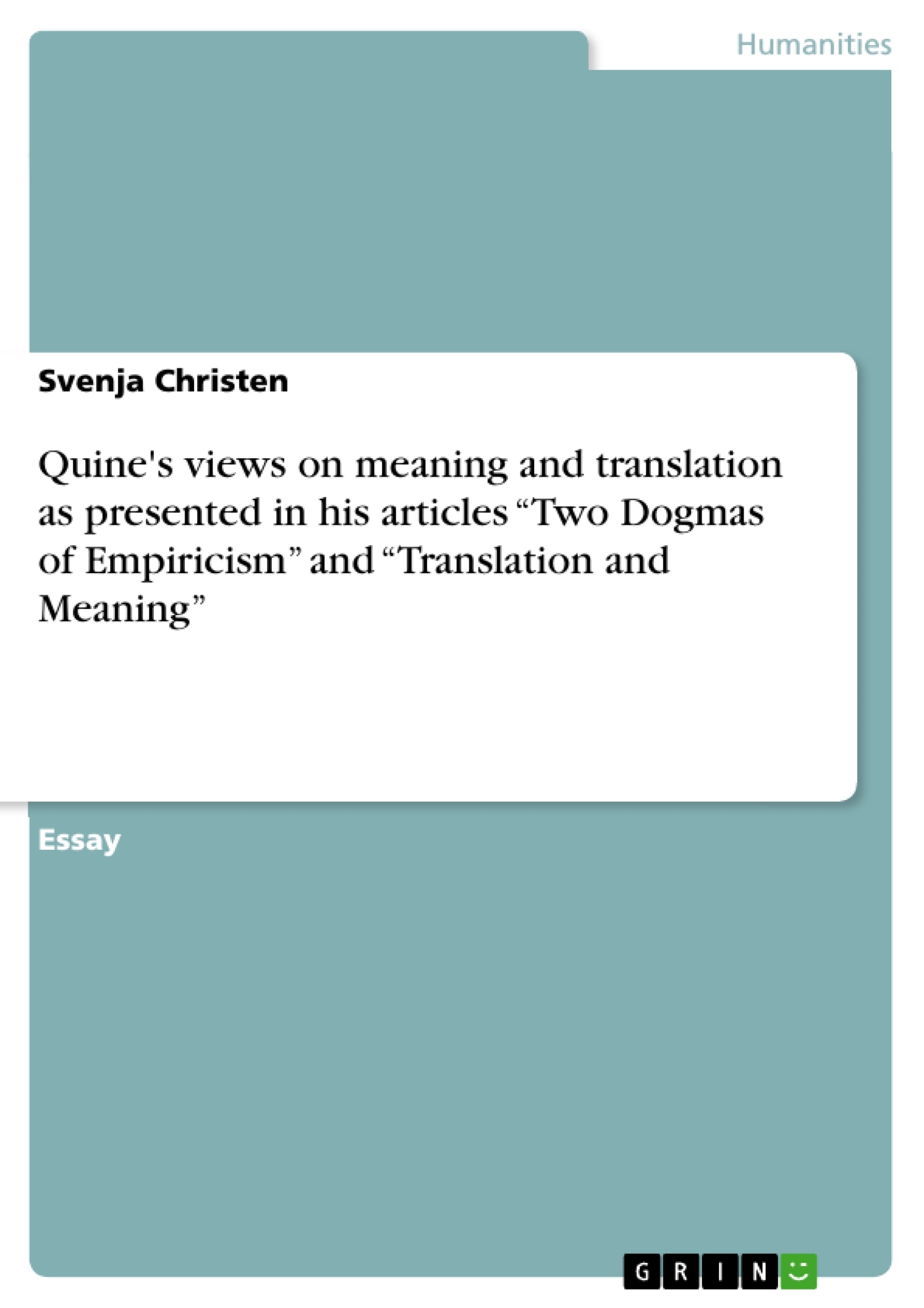In this paper I will concentrate on Quine’s views on meaning and translation as presented in his articles “Two Dogmas of Empiricism” and “Translation and Meaning”.
In the second chapter I will present his concepts related to the topic as presented in the two articles.
In the third chapter I will deal with the American structuralism and compare the structuralists’ concepts with those of Quine.
The final chapter will then be about the logical empiricism and Quine’s arguments against their concepts.
Table of Contents
- Structure
- Quine's views on meaning and translation
- Two Dogmas of Empiricism
- Translation and Meaning
- American structuralism
- American structuralism
- Quine's conception of meaning in relation to the American structuralism
- Logical empiricism
- Logical empiricism
- Quine's semantical theories as arguments against the logical empiricism
- Conclusion
Objectives and Key Themes
This paper focuses on the work of Willard Van Orman Quine and his views on meaning and translation, particularly as explored in his articles "Two Dogmas of Empiricism" and "Translation and Meaning." The paper analyzes Quine's arguments against traditional notions of meaning and the nature of translation, specifically addressing the limitations of defining analytical sentences and the challenges of translating between unknown languages.- The distinction between "analytic" and "synthetic" statements
- The difficulties of defining synonymy
- The role of stimulus situations in translation
- The limitations of radical translation
- Quine's critique of logical empiricism
Chapter Summaries
- Structure: This chapter outlines the paper's organization, focusing on Quine's views on meaning and translation and their relationship to American structuralism and logical empiricism.
- Quine's views on meaning and translation: This chapter explores Quine's argument in "Two Dogmas of Empiricism" that there is no clear distinction between "analytic" and "synthetic" statements. It examines his rejection of various methods for defining synonymy, arguing that all definitions ultimately fall short. It also explores Quine's notion of meaning and its relationship to naming and connotation.
- Two Dogmas of Empiricism: This section delves deeper into Quine's critique of the analytic/synthetic distinction, arguing that the idea of analytical truth is problematic. Quine highlights the circularity of definitions and the difficulties in defining synonymy, exploring issues with defining words through definition, substitution, and semantical rules.
- Translation and Meaning: This section examines Quine's concept of "radical translation," the process of translating from an unknown language to a known language. Quine argues that translation is fundamentally based on observing stimulus situations and the native speaker's reactions. He discusses the concept of stimulus meaning, differentiating between affirmative and negative stimulus meanings. This section explores Quine's notion of observationality, highlighting how the meaning of sentences can vary based on individual experiences and the role of truth functions in translation.
- American structuralism: This chapter explores the American structuralist approach to language analysis, focusing on its synchronic view of language and its methods for studying language, including the Corpus Method and the Axiomatic Method. The section examines the work of Leonard Bloomfield and his "A set of postulates for the science of language."
- American structuralism: This section delves further into the American structuralist approach, discussing its focus on synchronic analysis, its methods for studying language, including the Corpus Method and the Axiomatic Method, and the work of Leonard Bloomfield. It examines Bloomfield's postulates and their implications for understanding language, particularly his concept of utterances as basic data with form and meaning.
- Logical empiricism: This chapter examines the principles of logical empiricism and Quine's critiques of its core tenets. It highlights the contrast between Quine's views on meaning and those of the logical empiricists, setting the stage for further discussion in subsequent chapters.
Keywords
This paper examines key concepts in the philosophy of language, including meaning, translation, analytical statements, synonymy, stimulus situations, radical translation, observationality, truth functions, and logical empiricism. It explores the work of Willard Van Orman Quine, a prominent figure in 20th-century philosophy, and his critiques of traditional views on meaning and translation.
Excerpt out of 8 pages
- scroll top
- Quote paper
- Svenja Christen (Author), 2007, Quine's views on meaning and translation as presented in his articles “Two Dogmas of Empiricism” and “Translation and Meaning”, Munich, GRIN Verlag, https://www.grin.com/document/140539




